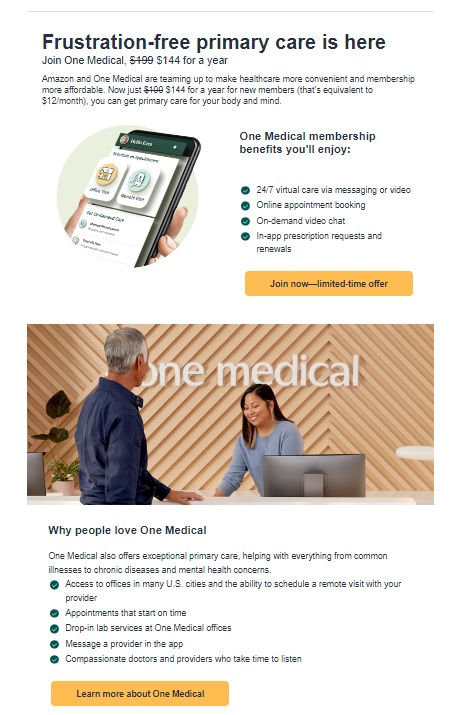Perhaps this Editor is not that much of an Outlier in thinking that these deals don’t beat, say, sliced bread. Oak Street Health (OSH) disclosed its financials in an SEC 10-K filed on Tuesday. One must wonder what CVS is seeing in the company other than bulking up its primary care profile. Their loss grew to $510 million from 2021’s $415 million. While OSH grew impressively in 2022 with a 51% increase in revenue to $2.2 billion, driven by 40 new centers ending with a total of 169 facilities in 21 states, expenses grew exponentially for the new patients: medical claims expenses grew 48%, cost of care went up 49%, and sales and marketing up 38%. Scalable, so they claim; profitable, not till 2025 at earliest.
Other problems were revealed in the 10-K. OSH has substantial business from other payers, which may not be pleased that CVS owns a small payer called Aetna, though has pledged to keep OSH payer-neutral. OSH leases or licenses most of its care centers from Humana. That payer also accounted for 32% of its 2022 capitated revenue. Centene’s plans and HealthSpring made up an additional 23%. Other, more routine concerns are regulatory review, attrition of physicians and clinician staff, and last but not least, breakup fees ($500 million if CVS walks away, $300 million if it’s OSH). When you add these to other factors as outlined in our earlier article, such as the Medicare Advantage and high-need populations, CVS is cutting off a hefty slice of loaf, especially considering that the more complex Signify Health buy is due to close this quarter. Earlier opinions on the buy [TTA 16 Feb], Healthcare Dive
 Now to Amazon and One Medical. This Editor received her invitation to buy a One Medical membership earlier this week (left). Countering this Editor’s analysis from last week, which maintains that Amazon is already under a broad antitrust microscope viewed by the Federal Trade Commission (FTC) and the Department of Justice (DOJ), Healthcare Dive counters, quite logically and in the view of their experts, that if either agency was going to object, they would have done so before the closing, and the grounds were likely too novel. The article concedes that the FTC could take action further down the road, for instance if Amazon violates HIPAA or consumer privacy with ad trackers. Instead, the focus is on objections by consumer groups, Amazon leveraging health data, privacy violations, and a general consumer unease around Amazon dealing with their health issues.
Now to Amazon and One Medical. This Editor received her invitation to buy a One Medical membership earlier this week (left). Countering this Editor’s analysis from last week, which maintains that Amazon is already under a broad antitrust microscope viewed by the Federal Trade Commission (FTC) and the Department of Justice (DOJ), Healthcare Dive counters, quite logically and in the view of their experts, that if either agency was going to object, they would have done so before the closing, and the grounds were likely too novel. The article concedes that the FTC could take action further down the road, for instance if Amazon violates HIPAA or consumer privacy with ad trackers. Instead, the focus is on objections by consumer groups, Amazon leveraging health data, privacy violations, and a general consumer unease around Amazon dealing with their health issues.
- Consumer protection group Public Citizen urged regulators to block the deal in a letter to regulatory groups after it was announced last summer. For instance, it could bundle One Medical and Prime membership (a no-brainer). By tying the two together, Amazon could gain consent for using patient data from health records. Amazon could also serve ads for products related to medical conditions without that access (that old Pixel/ad tracker business again). These concerns are publicly shared by two FTC commissioners.
- “Analysts said that data acquisition was likely a big driving factor for the deal. After linking One Medical’s data with that from its other products and services, Amazon can analyze petabytes of healthcare data in the cloud and use the findings to better manage the health of One Medical’s Medicare population, build new products and pinpoint people with rare diseases to solicit participation in clinical trials, according to (market research firm) Forrester’s (Natalie) Schibell.” [Editor] That would, of course, require patient consent.
- Forrester noted that the consumer unease around Amazon in healthcare is substantial. 34% of surveyed adults weren’t at all comfortable with Amazon for healthcare needs with an additional 17% only somewhat more comfortable (tier 2). Trust levels are low, and it would take only one or two incidents, such as a security breach or HIPAA violations, to destroy it. This Editor would add that if One Medical practices were not managed impeccably, that would go viral among individual and corporate members, in a way that Amazon Care did not.







Most Recent Comments